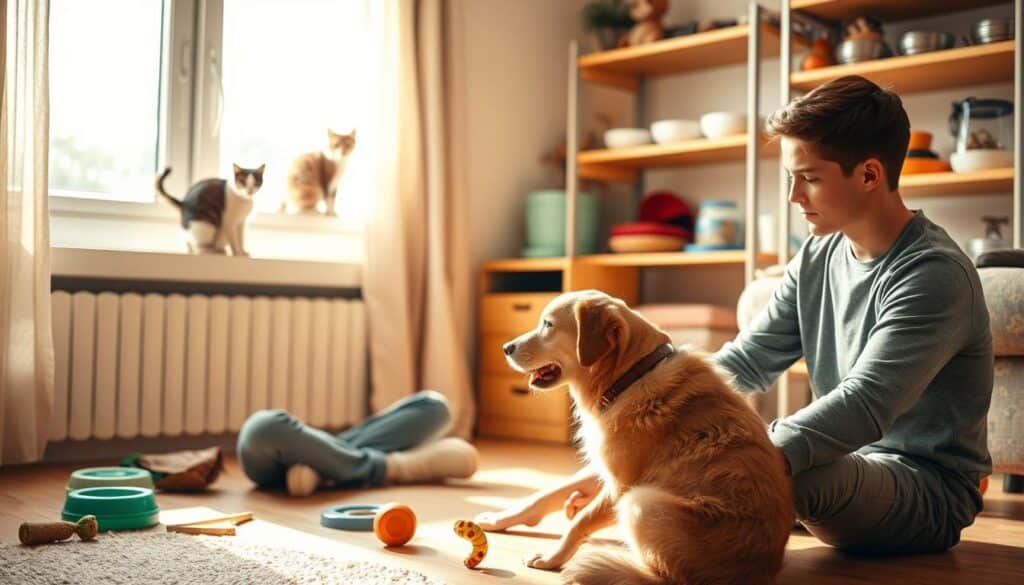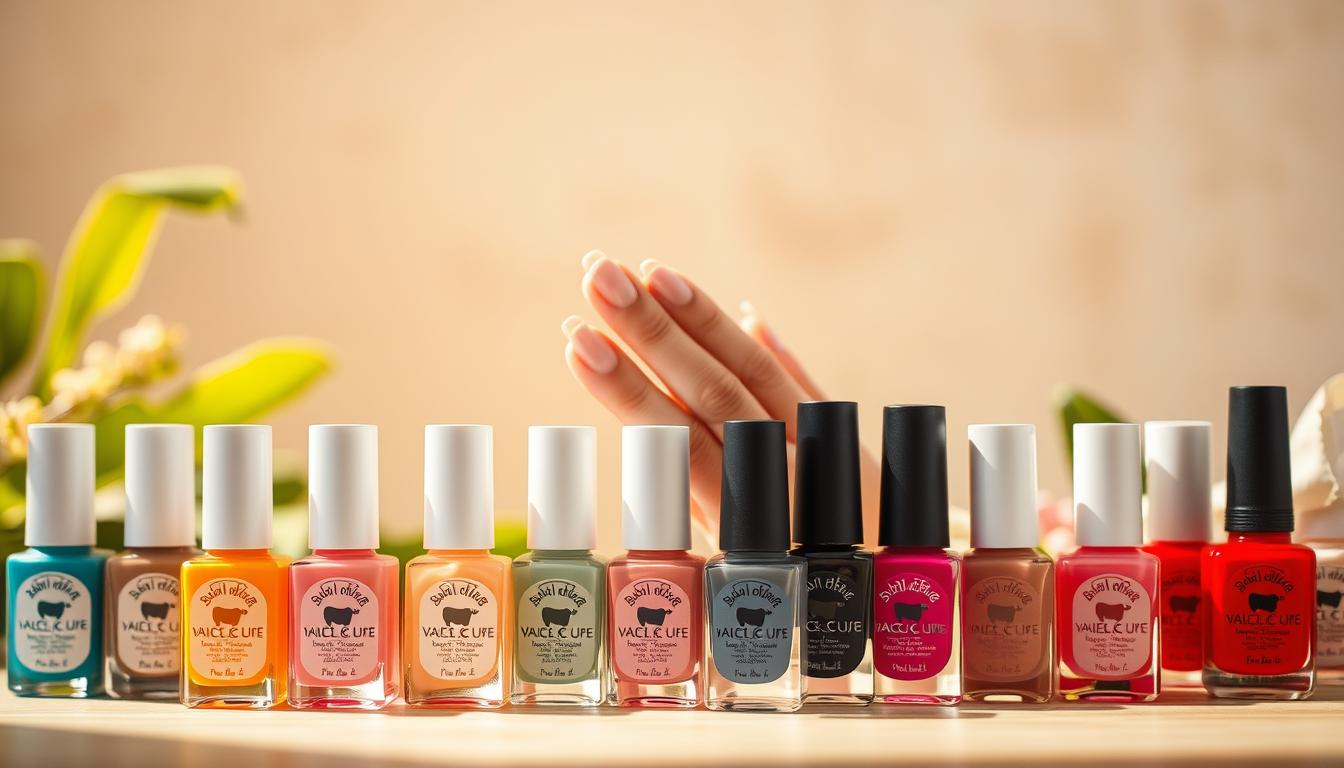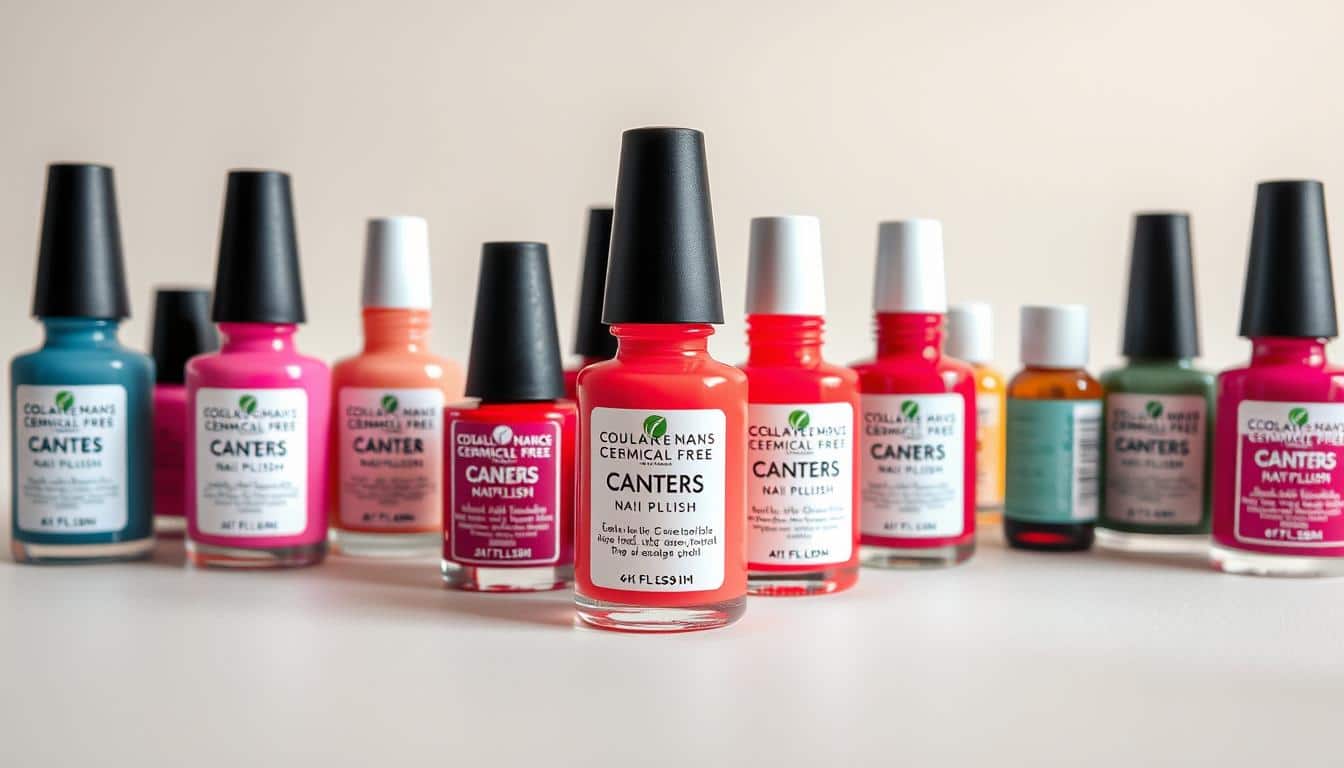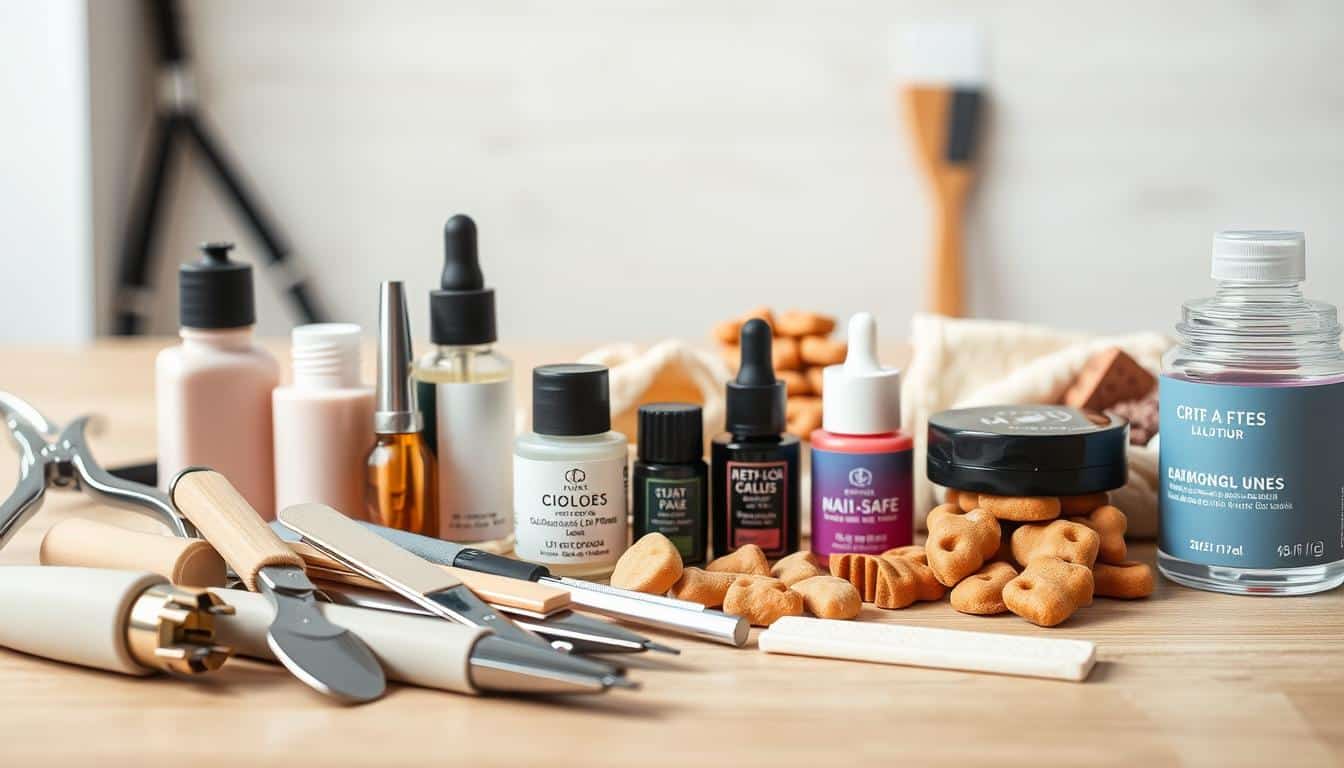Anúncios
As a pet owner, it’s very important to look after your furry friends well. This article gives vital tips on keeping pets safe. It covers responsible pet owning, good pet care, and much more. You’ll learn about meeting your pet’s needs, taking them for regular vet check-ups, and feeding them right.
We’ll also talk about keeping your pets safe at home, when traveling, and during outdoor fun. Following these tips is key to making sure your pets are happy and healthy.
Understanding Your Pet’s Needs
Understanding your pet means looking closely at their actions and what food they need. Each breed has its own way of acting and reacting. This influences how they get along with people and their surroundings.
Researching Breed-Specific Behaviors
Learning about your pet’s breed behavior is key. Some are lively and fun, while others are calm. Knowing this helps you train and socialize them better. Good training matches a breed’s nature, making pets and families live better together.
Assessing Nutritional Requirements
Pet health deeply depends on their diet. You should pick food based on their age, size, and health needs. Talking to a vet helps make a diet plan that boosts their health. The right food choices prevent serious health problems and improve pets’ lives.

The Importance of Regular Veterinary Visits
Regular vet visits are key to keeping your pet healthy. They let us find and fix health problems early. This keeps your furry friend feeling their best. Making these visits a priority means your pet’s health is closely watched.
Preventive Health Care
Preventive care means catching problems before they get big. At these visits, your pet might get:
- Comprehensive physical exams
- Dental assessments
- Weight management evaluations
- Routine laboratory tests
This care helps your pet live a longer, healthier life. Talking with your vet about your pet’s life gives clues for better care.
Vaccinations and Health Monitoring
Vaccines protect your pet from diseases. It’s important to keep up with your pet’s shots. This is because pets live different lives and face different risks. Some key shots are:
- Rabies
- DAPP (Distemper, Adenovirus, Parvovirus, and Parainfluenza)
- Bordetella (Kennel Cough)
Regular health checks are also crucial. They help catch chronic problems and other issues early. Such check-ups keep your pet’s health on the right track.
Balanced Nutrition for Pets
It’s important to give pets a balanced diet for their health. Owners need to pick the right food that fits their pet’s nutritional needs. The size, age, and any health issues of the pet are key in choosing their food.
Choosing Quality Pet Food
When picking pet food, look at the ingredients and nutritional value. Aim for brands that provide complete and balanced nutrition. Good pet food includes essential nutrients for your pet’s stage in life. Reading labels helps make sure your pet’s dietary needs are met.
Consulting with Your Veterinarian
Talking to a vet is crucial to pick the correct diet for your pet. A vet can check your pet’s health and suggest the right nutrition plan. Their advice is very important, especially for pets with special needs or health issues. Seeing the vet regularly keeps your pet healthy and avoids issues from bad nutrition.
Exercise and Playtime: Key to a Happy Pet
Keeping your pet active is super important for their health and happiness. Regularly exercising your pet helps them stay at a healthy weight. It also reduces chances of them acting out. Playing fun games together not only makes them happy but also strengthens your bond.
Benefits of Regular Exercise
Getting your pet to move regularly has big benefits. It helps keep their weight in check and their heart healthy. It can also make them feel less anxious or bored. Pets with plenty of exercise tend to behave better, making everyone at home happier. Spending time exercising your pet improves their life and brings you closer.
Engaging Play Activities
Adding a variety of playtime activities can really boost your pet’s health and happiness. Games like fetch, tug-of-war, or agility training can be very stimulating. Using toys that make them think can also make them happier. By mixing up their activities, playtime stays exciting for your pet.
Training and Socialization Techniques
Training and socializing your pet makes your relationship with them strong and happy. Teaching them basic obedience is at the heart of this training. Getting your pet used to various places, other pets, and people helps them be brave and behave better.
Basic Obedience Training
Teaching your pet to understand “sit,” “stay,” and “come” is key. These commands help you talk to your pet and set clear rules. Practicing these regularly makes your pet listen better and brings you closer.
Training sessions should be short and fun. This makes learning exciting for your pet and you.
Socializing with Other Pets and People
Socializing is very important for your pet’s behavior and happiness. Meeting different animals and people lowers their stress and fear. Going to parks or training classes are perfect chances for your pet to meet others in a safe way.
These moments help your pet get used to new friends slowly. It makes them more relaxed and friendly in different social settings.
Pet Safety Tips for Home Environments
Keeping pets safe at home is key for loving pet owners. Pet-proofing your house removes dangers. This makes sure pets have a safe space to enjoy. Following these tips helps protect your pets from risks.
Pet-Proofing Your Home
Start pet-proofing by looking around your home for dangers. Here are important steps to take:
- Store harmful chemicals and cleaners out of reach or in secured cabinets.
- Secure electrical cords to prevent chewing, which can lead to injuries.
- Remove poisonous plants from your home to avoid accidental ingestion.
Identifying and Removing Hazards
Check your home closely for more safety risks. Keeping pets safe means watching out for common dangers:
- Cover stove knobs to prevent accidental ignitions.
- Keep open flames and lit candles out of reach.
- Install baby gates to limit access to stairs or hazardous areas.
By using these safety tips, you make your home much safer for pets. This allows our pets to be safe and enjoy their space.
Traveling Safely with Your Pets
Traveling with pets means making smart choices for their safety and happiness. It’s important to keep them safe while moving, and find places to stay that are good for them.
Using Restraint Systems in Vehicles
Keeping pets safe in the car is a must. Using seat belts for pets or carriers helps avoid distractions. For better safety, pick crates that have passed crash tests.
Make sure to choose something comfy for your pet. This helps them stay calm during the trip.
Preparing for Pet-Friendly Accommodations
Plan ahead for places to stay that like pets. Looking up pet-welcoming spots makes sure everyone has a good time. Check for places with special areas for pets and nearby parks.
Don’t forget to bring their food, medicine, and toys they love. This keeps them happy and feeling good on the trip.
Food Safety for Your Pets
Keeping your pets’ food safe is key to their health. It’s important to know which foods can harm them. Dangerous foods like grapes, chocolate, and some plants can be very harmful if pets eat them. Learning about these foods helps prevent accidental poisonings.
Identifying Toxic Foods
Knowing about harmful foods is crucial for pet owners. Some food that looks safe can actually be dangerous. Harmful items include grapes, raisins, chocolate, onions, garlic, certain nuts like macadamia, and avocado.
- Grapes and raisins
- Chocolate
- Onions and garlic
- Certain nuts, like macadamia nuts
- Avocado
Make sure these items are kept away from pets. Always check food ingredients before sharing with your pets.
Creating a Safe Feeding Area
Having a specific place for your pet to eat can prevent accidents. Pick a spot away from clutter and possible dangers. Here are some tips for safe feeding:
- Establish a consistent feeding location.
- Use pet-specific dishes that are easy to clean.
- Keep other food items and human foods away from the feeding area.
- Monitor your pet during feeding time.
By using these tips, you’ll help keep your pets safe during mealtime. It’s a step towards a safer, healthier eating area for your furry friends.
Outdoor Safety Measures for Pets
Outdoor fun with pets is awesome but comes with risks. Making sure pets are safe outside helps them enjoy without danger.
Using Leashes and Harnesses
Leashes and harnesses help keep pets safe when outdoors. They stop pets from dashing into traffic and facing wild animals. A good harness also makes walks more pleasant for both pets and their owners.
Monitoring Weather Conditions
The weather is key to pet safety outside. Checking the weather before going out can protect pets. On hot days, make sure they have water and shade. When it’s cold, some pets might need clothes to stay warm.
Protecting Against Pests and Wildlife
Keeping pets safe from pests is vital. Checking them for fleas and ticks prevents health problems. Use preventive treatments and collars for extra safety. Knowing about local wildlife and teaching pets to stay away lessens bite risks.
Conclusion
Being a good pet owner means taking care of your pet’s needs for safety, health, and happiness. By following the tips in this article, you can make sure your pet feels loved and taken care of. It’s all about knowing what your pet specifically needs and making regular vet visits.
To keep pets safe, owners should always be learning and improving how they care for their pets. Pets change, and the way we care for them should too. Doing things that keep them active, healthy, and social will make them happy.
In the end, responsible pet ownership brings joy and love. Don’t forget to keep up with safety measures and health updates. Cherish every moment with your pet. Your efforts make a world of difference, creating a happy and safe home for them.



